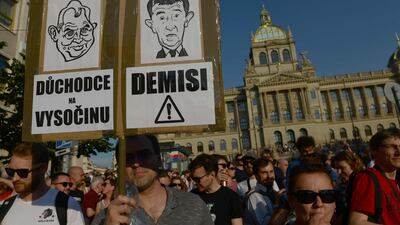Tens of thousands of Czechs hit the streets on Tuesday to demand the resignation of billionaire prime minister Andrej Babis over what they say are conflicts of interest.
Their accusations involve his former business empire and an investigation into a decade-old EU subsidy.
Organisers estimated 120,000 people protested in Prague's central Wenceslas Square, making it one of the largest demonstrations since the Velvet Revolution ended Communist rule in 1989.
Protests against Mr Babis have grown since the end of April when Czech police ended investigations into whether he illegally received a €2 million (Dh8.27m) EU subsidy for a farm and convention centre a decade ago. They recommended he face trial.
Protesters fear a newly appointed justice minister could interfere in the case, which is now in prosecutors' hands.
Mr Babis has denied wrongdoing, calling the case a political manoeuvre.
The anti-Babis movement received further impetus from a leak of preliminary audit findings by the European Commission.
It determined that Agrofert – a business empire built by the prime minister and spanning chemicals, food processing, farming and media companies – should not have had access to EU development funds in recent years.
"We will not act like it is normal that the prime minister of our country remains in such a conflict of interest that his personal problems damage the whole country," organiser Mikulas Minar told protesters.
"We are asking for the resignation of Andrej Babis."
Waving flags at Wenceslas Square, the scene for most momentous political gatherings in Czech history, protesters also carried signs saying "We've had enough", or "We don't want Babisstan".
"We no longer want to tolerate that Babis is robbing us," said Jana Tomesova, a financial adviser who travelled from the town of Pisek, about 110 kilometres south of Prague.
Mr Babis is Czech Republic's second-richest man, with $3.7 billion (Dh13.59bn) in assets, Forbes magazine says.
Mr Babis has clashed with western EU leaders over his tough anti-immigration policy but he has been more supportive of the bloc than nationalist leaders in Poland or Hungary.
Despite accusations of conflict of interest against him since he took office in 2014, his ANO party easily won the 2017 election, with 1.5 million votes.
That was almost three times more than the next closest party. Mr Babis ran on a platform to run the state with a businessman's touch and fight traditional party corruption.
ANO remains the most popular political force, although its support in a poll slipped to 28 per cent in May from 32 per cent in April.
Mr Babis shifted Agrofert into a trust fund arrangement in 2017 to comply with new Czech legislation on conflicts of interest.
But the leaked preliminary audit, subject to comments by the Czech authorities before being finalised, said the shift was an insufficient separation from his executive powers, because he was the founder and beneficiary of the trust funds.
If confirmed, the audit will be troublesome for him politically and for Agrofert financially, as funds received might have to be returned.
Mr Babis has rejected the findings.
Meanwhile, the head of the Greens party in the European Parliament on Tuesday urged EU antitrust chief Margrethe Vestager to investigate claims that the Czech Republic was providing illegal subsidies to companies linked to Mr Babis.
The Greens said they feared Agrofert might have received more than €10 million (Dh4.1m) in subsidies from the Prague government, which "might lead to a distortion of competition in the EU single market".
The European Commission was not immediately available for a comment.

